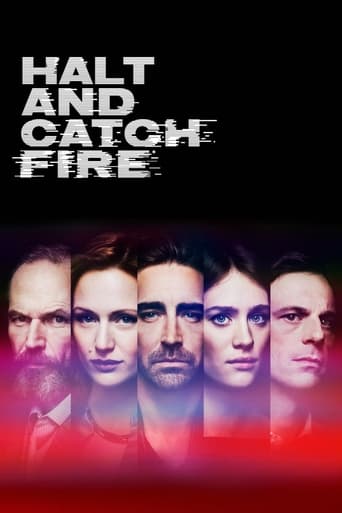

One of the best drama series of all times. Can't remember when I last cried watching a TV series, but "Halt and Catch Fire" made me sob. Wonderful characters. Compelling mixture of fact and fiction. Great actors.I lived through most of the computer history that is being presented in the plot-line, and I have to say: it is SPOT ON. I will remain a fan forever.
... View MoreAnd many of the plot points roughly parallel things going on in the industry at the time, going on with the founding of Compaq, HP, Intel, Apple and Microsoft. It is quick and dry and funny.It confounded me though to see the pronunciation of "kluge" butchered so completely and repeatedly. After the second time I thought to myself, "these people weren't even born when this industry was cutting its teeth!"Looking forward to seeing another season. In case no one ever got back to you about it, here's an examination of the word "kluge" from The Atlantic. com ===== "The vocabulary of computing can be baffling, and just when you have finally figured out the difference between a mainframe and a mini, they're almost obsolete," wrote Peter H. Lewis in a column for The New York Times back in 1993. In it, Lewis defined a brief list of terms from corporate computing culture, words and phrases like "server," "open systems," and "outsourcing." He also listed a few words and phrases that had trickled into the mainstream, like "hard-wired," "beta," and "bandwidth." And then, there was "kludge:"KLUDGE, pronounced klooj, is an inelegant but expedient solution to a problem, or a solution done hastily that will eventually fail. Examples: "We kludged it until we can figure out the right way to do it."The pronunciation of "kludge"-it rhymes with subterfuge and ice luge, not nudge and fudge-hints at its alternate spelling, "kluge," which is still commonly used among programmers. The discrepancy may also offer hints as to the earliest uses of the word, which, like "bug," has its own thicket of folklore to untangle."It's, um, complicated," the linguist and lexicographer Ben Zimmer told me in an email. "The short answer is that the word was originally spelled 'kluge'-derived from the surname Kluge, in turn from German klug, 'clever.' But then later it began to be spelled as 'kludge,' merging with a U.K. slang term with that spelling (apparently derived from a Scots word for 'toilet'). So now we often get the 'kludge' spelling with the 'kluge' pronunciation." Whew.Several sources trace the word's origins back to 1940s military usage, where it was apparently used in the Navy to describe electronic equipment that "worked well on shore but consistently failed at sea," according to the Jargon File, a compendium of hacker slang created by the developer Eric S. Raymond. But there are other hints that "kluge," dates back farther, perhaps as a reference to printing press equipment manufactured by Brandtjen & Kluge in the 1930s. A portion of a W.H. Farwell Company advertisement, which appeared in The Morning Herald (Uniontown, Pennsylvania) in 1938. (Newspapers.com) Newspaper ads from that decade describe Brandtjen & Kluge systems as modern marvels-automatic and ultra-fast-but they also had a reputation for being, well, pretty klugey, according to the Raymond's site: "temperamental, subject to frequent breakdowns, and devilishly difficult to repair.""The result of this history is a tangle," the Jargon File concludes. "Some observers consider this mess appropriate in view of the word's meaning."But ironically, given its definition, kluge is itself a fantastically nuanced word, too. Here's how the File describes sophisticated shades of its meaning:Take the distinction between a kluge and an elegant solution, and the differing connotations attached to each. The distinction is not only of engineering significance; it reaches right back into the nature of the generative processes in program design and asserts something important about two different kinds of relationship between the hacker and the hack. Hacker slang is unusually rich in implications of this kind, of overtones and undertones that illuminate the hackish psyche.The File also points out that kluge exists on a spectrum of related slang that might be used to describe the functionality (and beauty) of code more broadly, from "monstrosity" to "perfection."(Perfection in computer programming, of course, being a "mythical absolute, approximated but never actually attained.")
... View MoreI'm so glad I discovered this show and got to enjoy it through 4 amazing seasons. It's such a shame that the show didn't find the bigger audience that it deserved, but I feel privileged to have experienced this story play out.For those that dismissed it at the start as being a show about computers (and season 1 did take a little time to find it's groove), it became so much more than that and really was a story about the connections we make away from the computer screen.The final episode just ended the series so well - it was perfect for me and I'm still thinking about it even though it's been a few days since I watched it. I think I'm still in mourning!
... View MoreI have spent the past several months binge watching the four seasons of this series and enjoyed the way in which this program developed. I hated to see the last episode of the fourth season air and would have loved to have had more episodes yet to watch! Great job by all of the cast members. Everyone played well off one another.
... View More